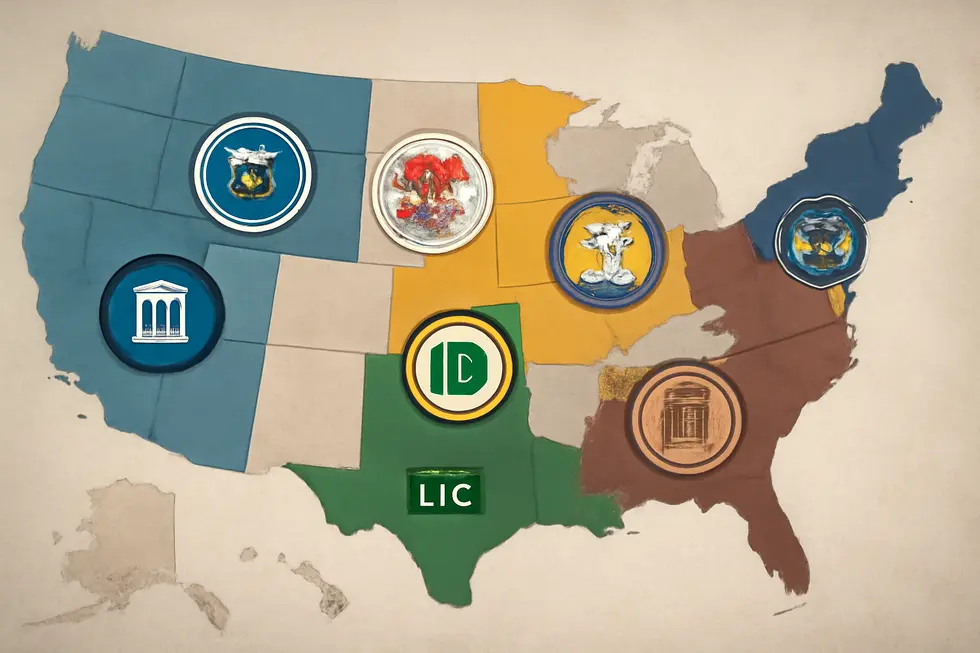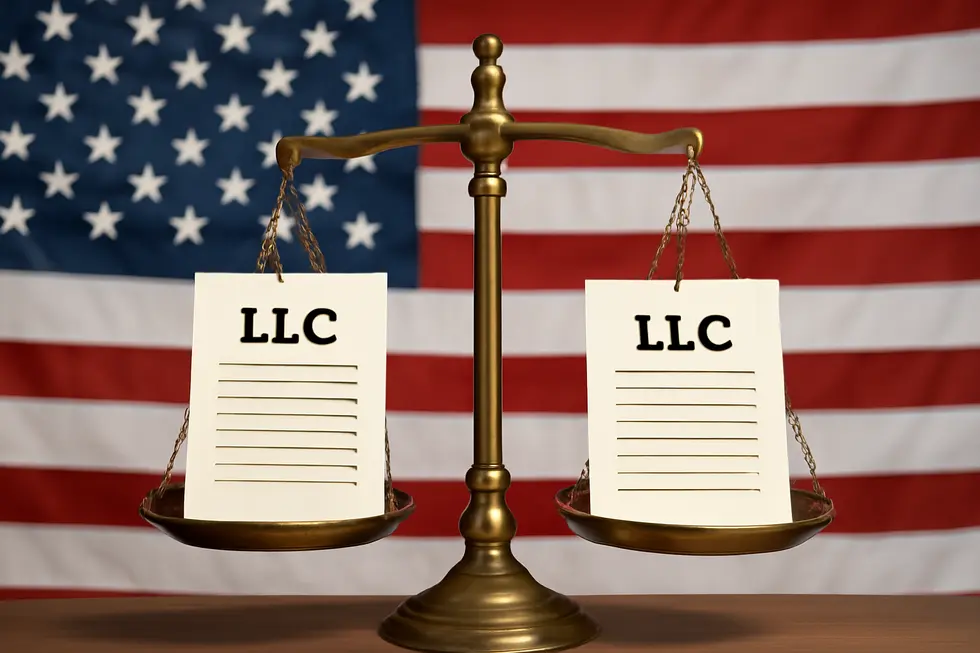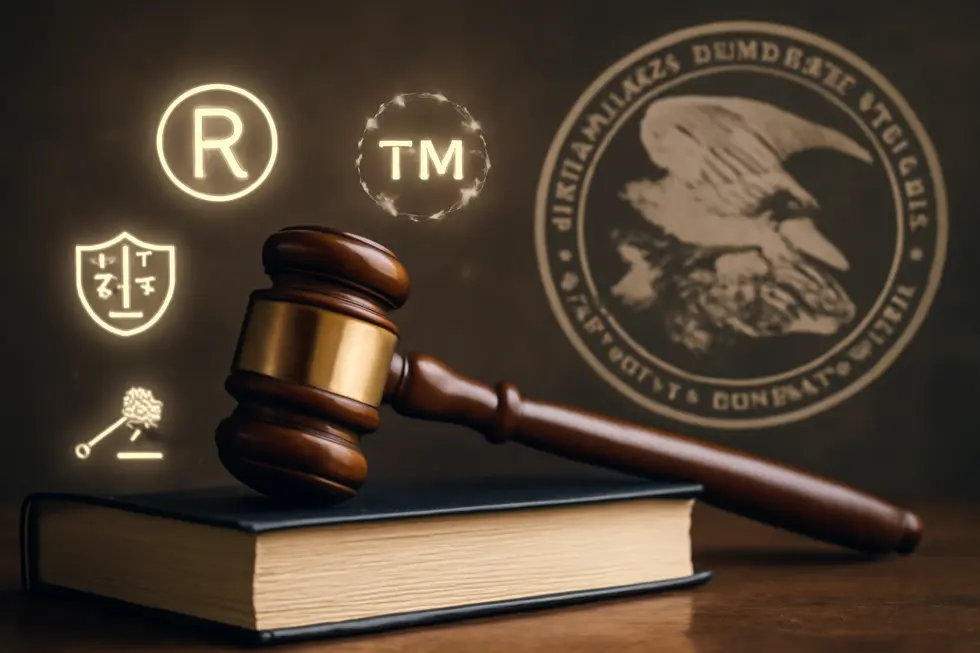Introduction
Choosing a business name is a foundational step for any LLC, raising an important question: can an LLC have the same name in different states? Understanding this dynamic can help business owners navigate registration, avoid legal pitfalls, and protect their brand. This exploration uncovers how state-level uniqueness governs LLC names, why no national exclusivity exists, and how federal trademark protections influence name availability across state lines. Each chapter builds on these critical aspects, empowering business owners with clarity on naming their LLCs while expanding or protecting their ventures.
Tables of Contents
Chapter 1: State-Level Uniqueness and Its Impact on Can an LLC Have the Same Name in Different States
- Navigating State Laws: How Regulatory Frameworks Shape LLC Name Uniqueness Across States
- Navigating Economic Identity and Market Presence Amid State-Level LLC Name Uniqueness
- Balancing State Name Registrations with Federal Trademark Rights: Navigating LLC Name Overlaps Across States
Chapter 2: No National Exclusivity: Understanding Can an LLC Have the Same Name in Different States
- State-Level LLC Name Registration: How Separate Jurisdictions Enable Duplicate LLC Names Across States
- Balancing State LLC Name Rights and Federal Trademark Protections: Navigating Naming Conflicts Across States
- Navigating Multi-State LLC Naming Challenges: Balancing State Rules and Federal Protections
Chapter 3: Federal Trademark Implications for Can an LLC Have the Same Name in Different States
- Navigating State LLC Naming Rules and Their Intersection with Federal Trademark Rights
- How Federal Trademark Registration Shapes Exclusive Rights Beyond State LLC Name Rules
- Avoiding Legal Pitfalls: Federal Trademark Consequences of Identical LLC Names in Different States
Chapter 1: State-Level Uniqueness and Its Impact on Can an LLC Have the Same Name in Different States

1. Navigating State Laws: How Regulatory Frameworks Shape LLC Name Uniqueness Across States
Each state in the U.S. independently governs the registration and uniqueness of LLC names within its jurisdiction. This decentralized system means that while an LLC name must be unique within a particular state, identical names can legally exist across different states without conflict. The responsibility for ensuring that an LLC name is distinguishable from others falls on the state-level Secretary of State office or equivalent agency, which manages the filing and approval of formation documents such as the Articles of Organization.
When entrepreneurs file to create an LLC, they must choose a name that complies with their state’s specific guidelines. These rules often include prohibitions against certain restricted words, requirements to include designators like “LLC,” and mandates to avoid names already in use locally. Most states offer convenient online name search databases, allowing applicants to confirm availability before filing. Some states also permit name reservations, temporarily holding a chosen name for up to several months while the LLC registration process is completed. However, these rules and protections apply solely within the boundaries of each state’s jurisdiction.
This means an LLC registered in Texas can hold the same name as an LLC in Florida with no legal obstacles from the states themselves. However, if an LLC intends to operate in multiple states, it usually must register as a foreign LLC in each additional state. In every state where the LLC is foreign qualified, the name must be unique per that state’s standards. Fortunately, this often allows the LLC to maintain consistency in branding by using the same name across state lines, provided it meets naming requirements locally.
While state laws regulate the uniqueness of LLC names within their borders, federal trademark law introduces a nationwide layer of protection that can influence LLC naming rights beyond state lines. A federally registered trademark delivers exclusive rights to use that mark or name in commerce across the country. This means a federally trademarked LLC name can restrict others—even those in different states—from using an identical or confusingly similar name for related goods or services. Therefore, conducting a thorough trademark search via the U.S. Patent and Trademark Office (USPTO) database is critical for business owners who want to secure broader name protection and avoid costly infringement disputes.
Understanding this state-level legal and regulatory framework is essential for effective business planning and branding. It allows entrepreneurs to grasp the scope of name exclusivity—they gain state-specific protection by registering an LLC name locally but must consider trademark laws to protect the name nationwide. For detailed information on LLC name regulations and how to verify availability in specific states, resources like the state government websites or comprehensive guides such as How to Start an LLC provide practical assistance.
2. Navigating Economic Identity and Market Presence Amid State-Level LLC Name Uniqueness
When forming a Limited Liability Company (LLC), businesses must grasp how state-level rules on name uniqueness shape their economic identity and market presence. Each state requires an LLC name to be distinctive within its borders to avoid consumer confusion and to protect existing entities. This creates discrete business identities localized by state ownership, allowing two or more LLCs to share the same name so long as their registrations occur in different states. While this arrangement facilitates smooth state-by-state administration, it also introduces layers of complexity for entrepreneurs operating or expanding across multiple states.
The economic implications of this regulation are significant. On one hand, local consumers and regulators benefit from clear distinctions between competing enterprises in the same jurisdiction, fostering trust and reliable branding. On the other hand, when an LLC chooses a name that matches an entity registered elsewhere, it must carefully consider potential confusion as businesses grow beyond their original state. Without national coordination on LLC naming, identical names may coexist in distinct markets, potentially diluting brand recognition and complicating customer outreach.
For businesses planning multi-state operations, understanding this landscape is crucial. While state-required uniqueness protects local business identity, it does not guarantee exclusivity beyond state lines. To secure a more comprehensive claim to a business name and reinforce economic branding across jurisdictions, many companies pursue federal trademark registration. A federally registered trademark extends protection nationwide, helping to prevent others from using confusingly similar names outside the initial LLC registration state. This step acts as a vital safeguard to preserve a brand’s integrity and economic value in an increasingly interconnected market.
Aside from legal protections, practical steps like reserving a business name prior to official LLC formation can help preserve chosen identities within particular states. States commonly allow name reservation, giving entrepreneurs time to finalize formation documents without risking name loss. This process supports strategic planning for business growth while complying with state-specific naming rules.
The dynamic created by state-centric registration fosters a patchwork of company names that coexist peacefully within boundaries but may overlap across states. Careful navigation of this system informs how businesses build and protect their identities in local economies and beyond. For those intent on broad market influence, complementing state registrations with federal trademarks is a prudent measure that addresses gaps left by decentralized name governance.
To verify the availability of a desired LLC name and explore name reservation options, consulting the Secretary of State’s website for each state is a practical starting point. For guidance on securing nationwide trademark protections to strengthen economic identity, reviewing detailed resources about federal trademark needs can provide clarity and direction.
For information about federal trademark options that can extend your LLC’s naming protections, see this guide on why a trademark may be necessary do I need a trademark for my business?.
Reference: How to Start an LLC – Name Registration & Reservation details howtostartanllc.com
3. Balancing State Name Registrations with Federal Trademark Rights: Navigating LLC Name Overlaps Across States
When forming an LLC, understanding the distinction between state-level name registration and federal trademark protections is crucial, especially for businesses considering expansion beyond their home state. Each state independently oversees LLC name registrations, ensuring names are unique only within that jurisdiction. This localized control means an LLC in one state can legally share its name with another in a different state without violating registration rules. State Secretaries of State enforce this uniqueness to prevent confusion within their borders, but these rules do not extend beyond state lines, creating the possibility for identical or similar LLC names nationwide.
Yet, while state registration focuses on administrative order within a single state, it does not create any national exclusivity over a business name. This is where federal trademark law plays a vital role. A trademark registered with the United States Patent and Trademark Office (USPTO) grants the owner exclusive rights to use that name, or a confusingly similar one, across the entire country. This protection transcends state boundaries and applies regardless of business entity type or LLC registrations. Essentially, while an LLC might register a name in its state, a federally registered trademark could block that LLC from using the same or a similar name commercially on a national scale.
This layered regulatory framework underscores an important business consideration: obtaining a state-approved LLC name is necessary but might not be sufficient for comprehensive brand protection. The federal trademark system acts as a safeguard against brand dilution or infringement, especially when companies conduct interstate commerce or offer goods and services nationwide. For example, a New York LLC might register the name “Green Leaf Innovations,” but if a California-based business holds a federal trademark for that name or a close variant, the New York LLC could face legal challenges if it expands or markets its services nationwide using the same name.
Beyond legal enforcement, understanding the interplay between state and federal protections aids strategic brand management. If a business owner plans to register and operate LLCs in multiple states, simply securing the state-level name may not prevent costly disputes or the need for rebranding down the line. Prudent entrepreneurs should research both the Secretary of State’s naming databases for each relevant state and the USPTO’s trademark database to identify potential conflicts early.
Interestingly, foreign LLC registration—where a company registers to do business in a state other than its formation state—does not override separate LLC name uniqueness requirements within each state. Even if an LLC operating out-of-state registers in another state as a foreign LLC, that state still enforces its naming rules independently. However, this registration is distinct from trademark rights, which can offer nationwide coverage irrespective of where an LLC is formed or authorized.
In summary, while state governments regulate LLC name uniqueness only within their borders, federal trademark law offers broad protection that can supersede state naming rights. This distinction is essential for any business owner seeking to protect an LLC’s identity beyond a single state. Considering both is a strategic necessity to navigate possible conflicts and build a strong, legally defensible brand presence across states.
For further guidance on trademark implications when forming an LLC, consult resources like Trademark2Go on whether you need a trademark for your business.
Chapter 2: No National Exclusivity: Understanding Can an LLC Have the Same Name in Different States

1. State-Level LLC Name Registration: How Separate Jurisdictions Enable Duplicate LLC Names Across States
LLC name registration operates strictly at the state level, which means no single, nationwide registry governs or restricts identical names across states. When you form an LLC and register its name with a state’s Secretary of State, you effectively prevent that same exact name from being used by another LLC within that state. However, this protection extends only to the borders of that jurisdiction and does not influence or limit name registrations in any other state.
This system allows for multiple LLCs to share the same name if they are registered in different states, so long as each name complies with the unique naming regulations of its respective state. For example, an LLC called “Green Solutions LLC” can coexist in both Florida and Oregon without any legal conflict stemming from name duplication at the state filing level. Each state treats its business registry as a separate entity, chiefly for administrative purposes such as organizing tax records, business filings, and compliance documentation.
The absence of a centralized national database for LLC names means exclusivity is purely local. This decentralized approach simplifies the registration process at the state level but also means business owners should not assume their LLC name is protected beyond the state in which it was registered. Without further steps, identical names can appear in numerous states independently.
For business owners seeking broader protection, relying solely on state LLC registration is insufficient. Nationwide exclusivity, which prevents other businesses from using a confusingly similar name across all states, requires federal trademark registration. Trademark protection, granted by the U.S. Patent and Trademark Office (USPTO), shields a name or brand across the country regardless of the business’s legal structure or state of incorporation. It also restricts others from using similar marks that could cause consumer confusion.
In essence, the key difference lies in purpose and scope: state LLC registration secures a business name primarily to avoid duplication within one state’s registry, facilitating administrative clarity, whereas federal trademarks establish enforceable rights to a brand nationally, with commercial and legal weight. This distinction is crucial to understand when considering brand development, expansion plans, and intellectual property strategy.
Many states additionally offer name reservation services, allowing applicants to hold a name temporarily while completing paperwork. This tool can help protect a chosen identity during the business formation process but does not enhance name exclusivity beyond state borders.
Ultimately, entrepreneurs should conduct thorough name searches within the intended state and also consult the trademark database before selecting and registering a name. This dual diligence prevents legal complications, costly rebranding, and potential infringement claims.
For a clearer understanding of the differences between LLC name registration and trademark protection, resources like Trademark2Go provide useful insights on when trademark filing is necessary to safeguard your brand nationally.
External reference:
- How to Start an LLC: LLC Name Search and Registration Process: https://www.legalzoom.com/articles/how-to-start-an-llc-llc-name-search-and-registration-process
2. Balancing State LLC Name Rights and Federal Trademark Protections: Navigating Naming Conflicts Across States
When forming a Limited Liability Company (LLC), business owners often assume that registering a name grants them exclusive rights nationwide. However, LLC name registration offers protection only within the specific state of formation, ensuring no other LLC or corporation in that state can use an identical name. This state-level exclusivity prevents confusion among local business filings and maintains clear legal identities. Yet, this protection does not extend beyond state borders. Because each state independently regulates business names, identical LLC names can coexist lawfully in different states without violating registration rules.
This decentralized system means an LLC in Texas can share the same name as an LLC in Florida without legal conflict under state law, as long as both comply with their respective states’ naming requirements. However, this state-based name reservation does not grant any rights to prevent others—even in different states—from using that name commercially or trademark-wise. Essentially, LLC registration creates a legal entity and secures a name only for administrative and tax recognition within that state, not a broader legal monopoly over the name.
In contrast, federal trademark registration confers nationwide rights to a business name or mark used in commerce, granting the owner legal presumptions of exclusive use across all states. Trademark holders may prevent others from marketing goods or services under confusingly similar names anywhere in the U.S., regardless of state registrations. Trademarks protect not only the business name but also logos, slogans, and other brand identifiers, providing more comprehensive brand security. This includes the ability to use the ® symbol and pursue enforcement through federal courts, which is unavailable to LLCs relying solely on state-level name registration.
This distinction is crucial since a federally registered trademark can override an LLC’s name registration in any state if the trademark owner challenges infringement. For example, an LLC may legally register a name in a given state even if that name is federally trademarked by another entity. However, the federally trademarked entity holds the right to stop the LLC from using that name commercially or advertising under it due to trademark infringement claims. Thus, federal trademark law acts as a critical safeguard for maintaining consistent brand identity across state borders, which state-level LLC name registration inherently lacks.
The practical implication for business owners is clear: while securing an LLC name registration is necessary to legally establish a company within a state, it should not be mistaken for comprehensive brand protection. To ensure exclusive use and avoid costly legal disputes, entrepreneurs should research existing federal trademarks through the U.S. Patent and Trademark Office (USPTO) database before finalizing a name. Additionally, if remote or interstate operations are planned, obtaining a federal trademark becomes essential for preventing confusion and protecting market presence nationwide.
This layered approach to name rights—state-level LLC registration paired with federal trademark enforcement—reflects the dual legal frameworks governing business identity. For a thorough understanding of how trademarks complement LLC name registration and to explore whether your business name merits trademark protection, detailed guidance is available on resources dedicated to trademark law and registration processes.
3. Navigating Multi-State LLC Naming Challenges: Balancing State Rules and Federal Protections
Limited Liability Companies (LLCs) operate under a legal framework where each state’s business registry independently manages name registration. This state-level approach means that an LLC in one state can legally share the same name as an LLC in another state without violating state laws. Such a setup offers flexibility for entrepreneurs but introduces significant considerations for companies aiming to expand beyond their initial state or establish a national presence.
At the core, the absence of national exclusivity in LLC naming means registering a business name in one state does not grant any rights or protections outside that jurisdiction. Each state enforces its own rules requiring LLC names to be unique within its borders, yet these protections do not extend across state lines. Consequently, your LLC’s name may face duplication in other states where another entity may have registered the same or an extremely similar name.
This scenario leads to practical challenges, primarily concerning branding and market confusion. When two LLCs share a name in different states, customers, partners, or vendors could mistakenly associate one business with the other, especially in today’s digital landscape where online searches cross geographic boundaries. Companies operating solely within one state may find this less problematic, but those with ambitions to conduct business in multiple states or establish an online presence must carefully weigh these risks.
To mitigate such issues, many businesses consider federal trademark registration. Unlike state LLC name registrations, a federally registered trademark grants the owner exclusive rights to use that name nationwide in connection with the specified goods or services. This federal protection supersedes state-level registrations and can prevent others from using confusingly similar names—even if those businesses are registered as LLCs in other states.
However, securing a federal trademark is an involved process that requires thorough research and compliance with trademark law. It is essential to verify that no existing trademark rights will be infringed upon, as an LLC name approved at the state level could still violate federally protected trademarks, risking legal disputes and forced rebranding. For this reason, consulting trademark databases and resources focused on trademark registration is crucial before expanding or investing heavily in a business name.
Another dimension is the use of DBAs (‘doing business as’ names). While DBAs allow a company to operate under a different name, they also do not guarantee exclusivity and are typically governed by state or local laws similar to LLC naming rules. This means that multiple businesses can hold the same DBA in different states or even within the same state if not closely monitored.
Finally, as companies expand operations and seek to register LLCs in multiple states, they must navigate each state’s unique naming rules and filing requirements. This often involves reserving names in advance, registering new LLCs under the same or related names where possible, or even altering business names to avoid conflicts. Adapting to these regulations while maintaining a consistent brand identity is a careful balancing act that demands strategic planning.
In summary, while the state-centric nature of LLC name registration allows the same name to exist in multiple states, the interplay between these state rules and broader federal trademark protections shapes how businesses name and protect their identities beyond any single jurisdiction. Understanding this complex landscape helps entrepreneurs safeguard their brand and reduce legal and operational risks when expanding across state lines.
For those exploring whether and how to protect LLC names beyond state borders, reviewing detailed trademark requirements and processes can be invaluable. Resources like this guide on the necessity of trademarks for business names offer critical insights into federal protections that complement state LLC registrations.
Chapter 3: Federal Trademark Implications for Can an LLC Have the Same Name in Different States

1. Navigating State LLC Naming Rules and Their Intersection with Federal Trademark Rights
An LLC can legally share the same name with another LLC registered in a different state because each state regulates LLC names independently. The essential requirement is that an LLC name must be unique and distinguishable only within the state where it is registered. This decentralized system means an LLC named “Green Leaf Solutions LLC” could exist in both Texas and Florida without violating state naming laws.
State authorities—typically the Secretary of State—oversee the registration of LLC names and enforce rules ensuring no two registered entities in their jurisdiction have confusingly similar names. Required elements, like including “LLC” or a variation, help signify the company’s limited liability status. States also place restrictions on names to prevent misleading associations with government bodies or professions requiring special licenses, such as banking or insurance. However, the issuance of a name by one state does not block the same name from being registered elsewhere.
While state name registration provides protection within borders, it offers no federal exclusivity. This distinction comes into sharp focus when considering trademark law. Federal trademark rights, secured through the United States Patent and Trademark Office (USPTO), provide nationwide protection for business names used in commerce in connection with goods or services. Such federal registration prohibits others from adopting the same or confusingly similar names beyond the boundaries of any single state, regardless of whether that name is registered as an LLC.
This difference means two LLCs operating under identical names in separate states will not violate state laws but could face legal challenges if one holds a federal trademark and actively uses the name in commerce nationwide. Particularly in today’s digital economy, overlapping markets or online presence can create confusion and risk of infringement. Thus, relying solely on state-level name approval can leave business owners vulnerable without federal trademark protection.
Furthermore, the federal trademark registration process includes a thorough conflict search against existing trademarks, adding a layer of scrutiny that state agencies do not perform during LLC name approvals. This process helps establish clear, enforceable rights that extend beyond geographic boundaries, offering peace of mind for businesses intent on growth or interstate expansion.
In practice, business owners should first ensure their desired LLC name complies with the specific state’s naming rules. Then, they should investigate federal trademark availability by searching the USPTO database to determine if the name is already federally protected. Securing a federal trademark protects the brand nationwide and can prevent costly disputes should an identically named entity appear in another state or market.
Many states permit reserving an LLC name prior to filing the organizing documents, which safeguards the name temporarily and reduces the chance of conflicts during registration. However, this reservation does not confer any federal rights or guarantee the name’s availability elsewhere.
Ultimately, understanding the interplay between state LLC naming requirements and federal trademark protections is crucial. While states govern name usage locally, federal trademark registration offers the broader shield needed to preserve a unique business identity and prevent infringement across the United States. For more detailed information on whether your business needs trademark protection alongside state LLC registration, reviewing specialized trademark resources can be invaluable.
Learn more about the importance of protecting your business name at Trademark2Go’s guide on whether you need a trademark for your business.
2. How Federal Trademark Registration Shapes Exclusive Rights Beyond State LLC Name Rules
When examining whether an LLC can share the same name across different states, federal trademark registration emerges as a crucial factor distinguishing state-level name registration from nationwide brand protection. LLC name registration is inherently a state-based process. Each state requires LLC names to be unique within its jurisdiction to avoid confusion within that market. However, this protection is confined to state borders, and no single state registration restricts an identical LLC name from existing elsewhere. As a result, multiple LLCs may legally operate under the same name in different states without violating state business registration laws.
This state-centric regulatory landscape changes significantly when federal trademark rights enter the picture. Federal trademark registration, administered by the United States Patent and Trademark Office (USPTO), grants an entity exclusive rights nationwide to use a registered name or mark in commerce. Unlike state business name registration, a federal trademark protects against the use of confusingly similar names across all states, preventing others from operating under those names or marks anywhere in the U.S.
Obtaining a federal trademark involves a more complex and formalized process than state LLC registration. The applicant submits a detailed application to the USPTO, demonstrating the name or mark’s use in commerce and its distinctiveness. The examination phase verifies eligibility and potential conflicts with existing trademarks. Once registered, the trademark owner gains powerful enforcement tools, including the right to bring infringement claims in federal court and leverage customs protections to stop counterfeit goods.
This federal layer of protection is essential when a business plans to expand across state lines or establish a strong brand presence nationally. It fills the gap left by state-level registration, which offers no brand ownership or exclusivity beyond its borders. Without federal trademark registration, an LLC might face legal challenges if another party federally registers a confusingly similar name, even if the LLC’s name is valid within its state.
The differing scopes and purposes of LLC name registration versus federal trademark registration clarify why an LLC can exist with a duplicate name in multiple states but still be vulnerable to trademark infringement claims. State registration serves primarily to identify the legal entity for taxation and regulatory purposes locally, while federal trademarks create enforceable brand rights used to protect consumer recognition and business goodwill nationwide.
Given these considerations, it is highly advisable for business owners to conduct thorough trademark searches early on via the USPTO database before selecting and registering an LLC name. This preventive step can save substantial legal costs and rebranding efforts later. Additionally, understanding the benefits of federal trademark registration and how it complements state registration strengthens a business’s ability to secure and defend its identity across the country.
For comprehensive guidance on federal trademark registration procedures, protections, and strategic value, resources like the USPTO website provide authoritative information that complements the state business registries’ offerings. To better understand whether trademark protection is necessary for your business name beyond LLC registration, consider consulting detailed insights such as those found through Trademark resources.
3. Avoiding Legal Pitfalls: Federal Trademark Consequences of Identical LLC Names in Different States
While state authorities require LLC names to be unique only within their own boundaries, this localized protection does not extend beyond state lines. This reality means that two LLCs can legally share the same name if registered in different states without violating state-level regulations. However, this apparent freedom masks a complex legal landscape ruled by federal trademark law, which can override state permissions and impose significant risks for businesses using identical names nationally.
State LLC registries focus primarily on preventing name duplication within their jurisdiction, ensuring that no two entities operating under the same business type have the same name locally. These rules help avoid confusion in daily business operations but do not address broader marketplace concerns, especially as businesses increasingly operate beyond their home states. The absence of a national registry for LLC names makes it possible—and quite common—for businesses in separate states to operate under identical LLC names.
Federal trademark protection, administered by the U.S. Patent and Trademark Office (USPTO), fills this gap by granting exclusive rights to the use of business names, logos, or other brand identifiers across the entire country. A federally registered trademark establishes priority and nationwide control, enabling the trademark holder to prevent others—even in different states—from using confusingly similar marks in ways that might mislead customers or dilute brand value.
The risks of ignoring federal trademark protections when selecting or maintaining an LLC name are substantial. Even if your LLC name clears state registration, it may infringe on an existing federally registered trademark, especially if both names are used in similar lines of business. This infringement can lead to costly litigation, forced rebranding, or restrictions on expanding operations across states. Furthermore, customer confusion arising from identical names in different locations can erode trust and harm brand reputation unintentionally.
For businesses aiming to operate in multiple states or to build a nationally recognized brand, securing a federal trademark is critical. This process involves conducting thorough searches of both state registries and federal trademark databases to detect conflicting marks. Utilizing resources like the USPTO’s online search tool ensures that the chosen name does not infringe upon existing trademark rights. Additionally, some states offer an option to reserve a business name prior to filing, but this reservation only holds weight within that state and offers no federal protection.
Strategically, registering a trademark at the federal level complements state-level LLC name registration by providing legal clarity and stronger protection against potential conflicts. This layered approach reduces business risks and supports risk management during interstate commerce or online marketing efforts.
To better understand trademark requirements and the nuances of protecting your business name beyond state borders, consulting expert guides on trademarks can be invaluable. Exploring resources such as comprehensive trademark guidance helps entrepreneurs decide when to pursue federal registration and how to safeguard their brand identity effectively.
For more detailed guidance on whether your business may need a trademark and how to ensure proper protection, information is available at trademark basics and registration considerations.
Final thoughts
Navigating the question, “Can an LLC have the same name in different states?” requires understanding the layered nature of business naming rights. At the state level, LLC names must be unique only within a single jurisdiction, allowing identical names to exist in different states legally. However, this lack of national exclusivity means entrepreneurs must consider practical branding challenges if expanding across states. Layered atop state rules, federal trademark law plays a critical role in protecting business names nationwide and can restrict LLC name use across states despite separate registrations.
Business owners should approach LLC name selection strategically—conducting both state-level name availability searches and federal trademark clearances—to safeguard their brand, avoid disputes, and build a sustainable identity. This holistic understanding empowers owners to confidently establish and grow their businesses with clarity and peace of mind.
Your IP is the foundation of your success – let’s protect it together before it’s too late. We can’t wait to help you turn your ideas into legally secured assets.
About us
At trademark2go.com, we’re your go-to partners for simplifying trademark, patent, and copyright registration. Our team of IP experts cuts through legal complexity, avoids common pitfalls, and delivers personalized guidance – whether you’re a startup, inventor, or creator. We prioritize your goals, turning your ideas into legally secured assets with clarity and care. Let’s protect what drives your success, together.


